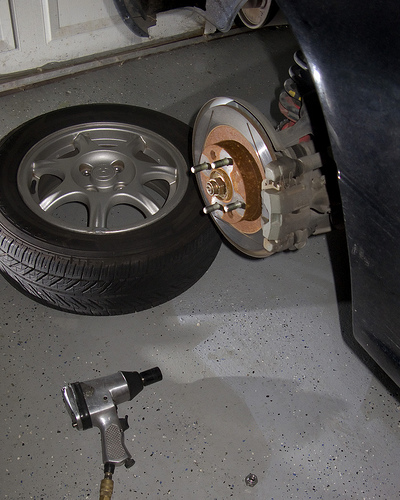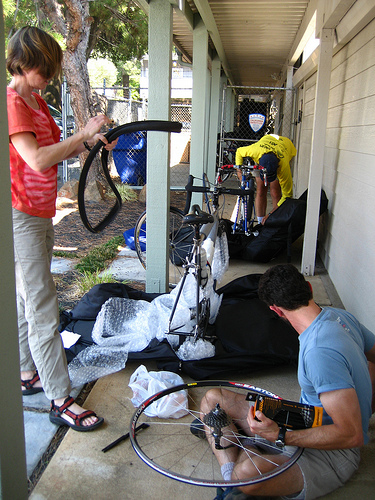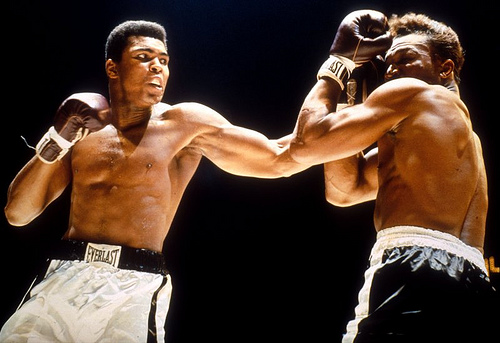Start by doing what’s necessary; then do what’s possible; and suddenly you are doing the impossible. – St. Francis of Assisi
What does that mean?
To me, it is all about momentum. Objects at rest remaining at rest. Objects in motion remaining in motion. Only the outside force being applied is typically yourself (or in the case of an intervention, someone else).
It means you start at the beginning. Do that which needs to be done. Then, with some momentum built up, you roll on to the open field of possibility. When doing the possible becomes common, soon you will find the difficult has become easier. And what was once impossible is now within your grasp.
Why is momentum important?
Momentum, as defined at thefreedictionary.com, is “a driving power or strength.” At least that’s what’s left after you get past all the physics equations. Sir Isaac Newton, after whom an entire branch of Physics is named, formulated Newton’s laws of Motion, the first two of which relate to momentum.
The first law states that nothing changes, unless an outside force acts on an object. In this case, we are talking about you. If you have some momentum, you will continue to move at the same pace and in the same direction unless, and until, another force acts upon you. That can be an outside force (an intervention, friendly urging or something in-between) or it can come from within (where you decide you’ve had enough and you’re going to do something about it). However, if you are at rest (on the couch or in your computer chair), you will remain at rest until a force acts upon you. The forces will come from the same sources, it’s just a little easier to work with something that is already in motion than to get a stationary object moving (more physics, but I digress).
The second law states that how quick you go depends on the size of the force acting on you. That force can also have a direction. Try to select forces that move you in a constructive direction, giving you constructive momentum and try to avoid those that will push you into a downward spiral. The force will act for a certain amount of time. Then it will dissipate or fade. How many times have you started something and then had it become less frequent until it stopped again? My exercise program used to look like that. So to keep momentum, you will have to keep up the pressure, keep using the force. Also, the size of the force acting on you is important. If someone you really don’t care for says you should lose weight, what impact does that have? Does it generate momentum? Not for me, at least. If someone who I know cares about me, and for whom I care, says the exact same words, there is a much greater impact. Does it work that way for you?
Where can I apply this in my life?
So, we are looking to find a force to help move us in a positive direction. Let’s grab something to write on and start a list of things you want to do, but haven’t gotten around to just yet. Let’s try to get at least a dozen things. Start with loose 10 pounds (at least most of us need to), then add get into better shape (you can define that later), and work from there. Chores around the house? Projects that need doing? Be sure to add at least one thing that you presently consider impossible. We’ll get to that later.
Now take the list and break things into a couple categories ranging from impossible down to necessary. Let’s start with something you think is fairly easy and on the necessary list. Write down all the things that are keeping you from doing this thing. Do they include a lack of knowledge? A lack of skill? A lack of money? A lack of enthusiasm? Write each one down. Now consider each impediment separately. What would it take to overcome this one? If you don’t have the skill, can you hire out the parts you can’t do? Can you find a friend who can help you learn how? If it’s a lack of cash, can you find someone to barter with, to find something you can do for them so they can do this for you?
Now that you have a list of things that are holding you back, and a list for each of the impediments of how you might proceed despite their presence, it’s time to get some force. You are going to need some force to push yourself over, under or through those impediments. For each of the impediments, come up with three good reasons why you have to, why you must move beyond them. If your reason only rises to a should, you will be hard pressed to get the amount of force needed to get you moving, nor will the force last very long before fading away.
One last thing to come up with is the big why – the why for the item from your ‘necessary’ list. It should be big and compelling. Come up with at least three, and then see which one works the best. Keep the others, as eventually even the greatest reasons start to be worn down by excuses. If the task is loosing weight, you might use “to become more healthy.” I don’t know about you, but that’s not too compelling to me. “To be able to keep up with my 5 year old son” is what worked for me. Find something that really motivates you (we’re back to the force that will provide a strong, enduring push). If you are still having trouble, check out a prior blog post, which covers accomplishments and why we do what we do. It might help you find a better reason to do these things. Remember, the why, the force acting on us, needs to be strong, be the moving us in the proper direction and be persistent. You should have covered the first two already, but make a plan to revisit your reason why on a frequent basis to help keep up the momentum.
Now that you have a big enough why, we can worry about the how, because it doesn’t matter what the how is, if you don’t have a why to move you, right? Now comes the fun part. For the item in the ‘necessary’ list we have been working on, it’s time to come up with a plan. Then we need to work on a strategy to accomplish the plan. Then comes the work on the tactics to use to implement the strategy. The above are links where I discuss how I break things down, and make sure I know what I am doing and how I am going to accomplish them. Yes, it takes a bit of time, but to me, it’s an investment in my future success. It might be overkill for planning a trip to the grocery store, but when you’re rebuilding a car, it really helps. I also have a perfect record so far – plans may have been delayed and others have been significantly altered, but none have failed as yet. Please take some time and map the project out, even if you don’t use my methods. You need both the big picture and the methods you will use to accomplish the tasks that make up the plan.
Now you have the plan, and how you will accomplish it. You also have a reason why, and a little bit of momentum, so all that is left is to get started on the plan. Hopefully you have a small task, one that is quickly and easily accomplished, written into the plan. Find it and do it immediately. If you don’t, find one or make one, and do it immediately. It can be as simple as calling or e-mailing a friend or family member and committing to the action, or posting it on FaceBook or Twitter. Do it NOW! Yes, walk away from the computer if you need to, it’s not going anywhere. There, do you feel better now? You have some real momentum, and the project is under way.
Now you can go through all the rest of the items in the necessary category and get them written up. Depending on the amount of time each will consume, select another one or two to get started on, and knock out that first task. Keep busy, and as you finish them, add a new one in. Larger tasks might move a little slower, and if you need to speed it up, finish one of the other tasks and delay adding a replacement until you have accomplished the heavy hitters in the other task. Eventually you’ll need a break, but be sure to reacquaint yourself with your reasons why once you return, and get back into the swing of things. Keep the Mighty Mo (momentum) going!
Remember, as you move through your plan, that things won’t always go as planned. Be sure to remember to use courage and intelligence to steady yourself and to keep making progress.
We’ve saved the impossible category for last. Take one of the items from that category and repeat the process (above) again. Does it seem a little less impossible? Set it aside (I like tucking a reminder in my day planner, or setting a reminder on the computer) and revisit it in about 6 months and see what you think about it then. I think you will be amazed at what you can do, if you can keep up the momentum.
From: Twitter, @tonyrobbins
confirmed at : http://www.brainyquote.com/quotes/quotes/f/francisofa121023.html













